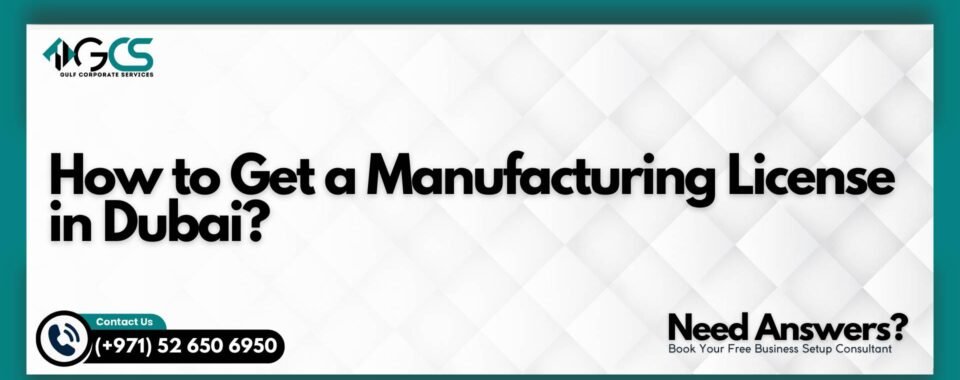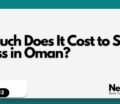
The United Arab Emirates (UAE) has rapidly transformed from an oil-driven economy into a global manufacturing and industrial hub. Entrepreneurs and investors from around the world are exploring how to start a manufacturing company in UAE, driven by the country’s modern infrastructure, business-friendly regulations, and strategic global location.
Whether you want to manufacture food products, cosmetics, machinery, furniture, or technology equipment, you’ll need a manufacturing license in UAE — a specialized permit that legally allows industrial production. This guide explains everything you need to know, including the process, cost, approvals, and requirements to start a manufacturing business in Dubai or anywhere in the UAE.
What Is a Manufacturing License in UAE?
A manufacturing license in UAE is an official approval issued by the Department of Economic Development (DED) or a relevant free zone authority. It allows a business to engage in the industrial production of goods, including assembling, processing, packaging, and fabricating raw materials.
Purpose of the License
The license ensures that manufacturing companies meet national safety, quality, and environmental standards. It also helps the government track and support industrial growth in line with sustainability goals.
Activities Covered Under a Manufacturing License
Depending on your business type, your license may cover:
- Food and beverage production
- Textile and apparel manufacturing
- Furniture and home goods production
- Machinery and equipment assembly
- Pharmaceutical and cosmetics production
- Electronics and plastic manufacturing
Each activity requires separate approvals, depending on the product and the emirate of registration.
Understanding the Manufacturing Industry in the UAE
The UAE government has made manufacturing one of its top priorities under the UAE Industrial Strategy 2031, which aims to make the country a global hub for advanced industries and export-oriented production. The vision focuses on innovation, sustainability, and technology to drive non-oil GDP.
Why Manufacturing Thrives in the UAE
The UAE offers everything an industrial investor needs: strong logistics, advanced infrastructure, tax benefits, political stability, and easy access to regional and international markets. Dubai and Abu Dhabi serve as gateways between Asia, Africa, and Europe, making them ideal for manufacturing and re-export.
Manufacturers benefit from world-class ports, low import duties, and abundant free zones tailored to specific industries — from food processing to automotive assembly and advanced materials.
Types of Industrial Licenses in the UAE
When setting up a manufacturing company in UAE, you’ll need to apply for an industrial license. The exact authority and type depend on your location — mainland or free zone.
Mainland Industrial License in Dubai
The industrial license in Dubai is issued by the Department of Economy and Tourism (DET), previously known as the Department of Economic Development (DED). It’s suitable for companies that plan to manufacture goods within the UAE and sell them across the mainland or export internationally.
To qualify for a mainland industrial license, you must have a physical warehouse or factory, approved machinery, and industrial permits from Dubai Municipality and other concerned authorities.
Free Zone Industrial License
If your focus is export-oriented or you want to enjoy 100% ownership, setting up a manufacturing unit in a free zone may be ideal. Zones like Jebel Ali Free Zone (JAFZA), Dubai Industrial City, RAKEZ, Sharjah Airport International Free Zone, and KIZAD offer ready-to-use warehouses and advanced industrial infrastructure.
Free zones allow tax exemptions, full foreign ownership, and simplified customs procedures. However, if you wish to sell products in the mainland market, you may need to appoint a local distributor or obtain additional permissions.
Key Authorities Involved in Obtaining a Manufacturing License in Dubai
When applying for a manufacturing license in Dubai, several government bodies play a role in approvals. The exact authorities may vary depending on your industry and location, but the major ones include:
Department of Economy and Tourism (DET)
Responsible for issuing the main trade and industrial license for mainland companies. It ensures your business activity, trade name, and ownership structure meet local laws.
Dubai Municipality
Handles construction, environmental, and health-related approvals. Before starting production, your facility must meet the municipality’s industrial safety and sanitation standards.
Ministry of Industry and Advanced Technology (MOIAT)
Oversees federal industrial regulations, ensuring national compliance for quality, sustainability, and technical standards.
Dubai Civil Defense
Approves fire safety systems, emergency exits, and risk control procedures at your manufacturing site.
Ministry of Health (for food, cosmetic, and pharma industries)
If your products fall under health or food regulations, approvals from the Ministry of Health and Prevention (MOHAP) or the Dubai Health Authority (DHA) are required.
Steps to Obtain a Manufacturing License in UAE
Setting up a manufacturing business in Dubai or any emirate involves several steps. Each stage ensures your business is properly registered, safe, and compliant with industrial standards.
Step 1: Identify the Type of Manufacturing Activity
Define the nature of your production — what products you’ll manufacture, what raw materials you’ll use, and whether your process involves assembly, packaging, or chemical processing. Each activity type determines your license category and required approvals.
Step 2: Choose Your Business Structure and Location
Decide whether to register on the mainland or in a free zone. For mainland, DET handles registration, while free zones have their own authorities. You’ll also need to select a legal structure such as a Limited Liability Company (LLC) or Sole Establishment.
Step 3: Obtain Initial Approval
Submit your trade name, ownership details, and business activity for initial approval. This confirms your business is eligible for manufacturing operations.
Step 4: Secure Industrial and Environmental Approvals
For mainland companies, Dubai Municipality or the emirate’s industrial department will inspect your facility layout and ensure it meets safety, health, and environmental guidelines. You may also need environmental clearance from MOCCAE (Ministry of Climate Change and Environment) if your process produces emissions or waste.
Step 5: Lease or Construct a Manufacturing Facility
You must have a physical location approved for industrial use — usually in an industrial area or free zone. Submit building layouts, safety plans, and infrastructure details for inspection and final approval.
Step 6: Apply for Final Manufacturing License
Once all approvals are complete, submit your application with supporting documents to DET or your free zone authority. After review, your manufacturing license in UAE will be issued, allowing you to begin production legally.
Required Documents for a Manufacturing License in UAE
When applying, prepare these key documents to speed up the process:
- Copy of trade name reservation and initial approval
- Passport copies and Emirates IDs of shareholders
- Lease agreement or Ejari for factory or warehouse space
- Detailed business plan with process description
- Equipment list and machinery specifications
- Environmental and safety approval certificates
- No Objection Certificate (NOC) from the landlord (if applicable)
Authorities may request additional documents depending on your product category and manufacturing scale.
Facility Requirements for Manufacturing Companies
A manufacturing company in UAE must operate from a dedicated facility designed for industrial use. This is mandatory for both mainland and free zone entities.
Factory Layout and Design
Your factory layout must allocate separate areas for raw material storage, processing, finished goods, and waste disposal. Proper ventilation, drainage, and fire control systems are essential. Authorities inspect these before issuing final approval.
Machinery and Equipment
All machinery used must meet UAE and international safety standards. If you are importing equipment, you must provide technical details and certification of origin. Maintenance and safety protocols should be documented.
Safety and Environmental Compliance
Fire alarms, extinguishers, emergency exits, and spill control systems are mandatory. If your process generates waste, recycling and waste disposal systems must be in place.
Benefits of Starting a Manufacturing Business in Dubai
Launching a manufacturing business in Dubai offers significant benefits, supported by strong industrial policies and incentives.
Strategic Global Location
Dubai’s location connects manufacturers to markets across Asia, Africa, and Europe. The presence of major seaports and airports enables smooth logistics and export operations.
100% Foreign Ownership
Most industrial activities now allow full foreign ownership, giving investors total control over profits and operations.
Tax Benefits
The UAE offers zero personal income tax and competitive corporate tax rates, with free zones providing exemptions for many years.
Advanced Infrastructure
Industrial areas like Dubai Industrial City and JAFZA offer ready warehouses, utilities, and logistics support — reducing setup time and cost.
Government Support and Financing
Initiatives like the “Make it in the Emirates” campaign and MOIAT’s financing programs help new manufacturers scale production with access to capital and innovation incentives.
Costs Involved in Getting a Manufacturing License in Dubai
The cost of obtaining a manufacturing license in Dubai varies based on factors like factory size, location, and business activity.
Licensing and Approval Costs
Initial approvals, trade name reservation, and final licensing typically range from AED 10,000 to AED 25,000. Industrial area rent or land cost is separate.
Facility and Setup Costs
Depending on your production scale, factory setup costs can range between AED 250,000 and AED 1 million, including machinery, construction, utilities, and permits.
Operational Costs
Ongoing expenses include raw materials, labor, power, water, maintenance, and transportation. Free zones may offer discounted utility rates for industrial units.
Mainland vs Free Zone for Manufacturing Companies
Choosing between mainland and free zone setups impacts ownership, taxation, and operational flexibility.
Mainland Manufacturing License
Mainland companies can manufacture and sell directly within the UAE market without restrictions. They can also tender for government projects and export globally. However, they must comply with local municipality and federal industrial rules.
Free Zone Manufacturing Setup
Free zones offer faster setup, full ownership, and simpler customs. They’re perfect for export-driven businesses. However, to sell products in the UAE mainland, you’ll need a local distributor or to register with customs for import clearance.
Industrial Areas and Free Zones for Manufacturing in the UAE
Several specialized zones cater to different manufacturing industries:
Dubai Industrial City (DIC)
Focused on manufacturing, logistics, and packaging, DIC offers ready infrastructure, energy-efficient facilities, and access to key highways and ports.
Jebel Ali Free Zone (JAFZA)
A world-class hub for large-scale manufacturers in electronics, automotive, and construction materials.
Khalifa Industrial Zone Abu Dhabi (KIZAD)
Located near Khalifa Port, KIZAD offers integrated transport and logistics services with competitive lease rates.
Ras Al Khaimah Economic Zone (RAKEZ)
A popular destination for SMEs with cost-effective facilities and easy licensing for light and medium industries.
Conclusion
Starting a manufacturing company in UAE opens doors to one of the most advanced and investor-friendly industrial markets in the world. With access to modern facilities, strategic trade routes, and supportive government policies, Dubai and the wider UAE are ideal for entrepreneurs aiming to build a sustainable, scalable, and globally connected business.
From obtaining an industrial license in Dubai to setting up your factory and ensuring compliance, each step requires careful planning. For a smooth and professional experience, it’s always best to work with experienced Business Setup Consultants in Dubai, UAE who understand every legal and operational detail.
FAQs
What is a manufacturing license in the UAE?
A manufacturing license is a legal document that allows you to produce, assemble, or process goods in the UAE. It’s issued by DET for mainland or by free zone authorities.
How long does it take to get a manufacturing license in Dubai?
The process usually takes between 2 to 6 weeks, depending on activity approvals, facility readiness, and compliance inspections.
Can foreigners own a manufacturing company in Dubai?
Yes. Foreign investors can now own 100% of a manufacturing company in most sectors, both in free zones and on the mainland.
What are the main documents required?
You’ll need trade name approval, a detailed business plan, passport copies of shareholders, lease agreement, factory layout, and safety/environmental certificates.
How much does it cost to start a manufacturing business in Dubai?
The setup cost typically ranges from AED 250,000 to AED 1 million, depending on location, equipment, and production scale.
Can I sell products in the UAE if my company is in a free zone?
Yes, but you must appoint a local distributor or register your products through UAE customs for mainland sales.
Do I need environmental approval?
Yes. Manufacturing companies must comply with environmental and waste management regulations, especially those producing emissions or by-products.
What are the best zones for manufacturing in the UAE?
Popular areas include Dubai Industrial City, JAFZA, KIZAD, and RAKEZ, each offering different advantages depending on your industry type.








